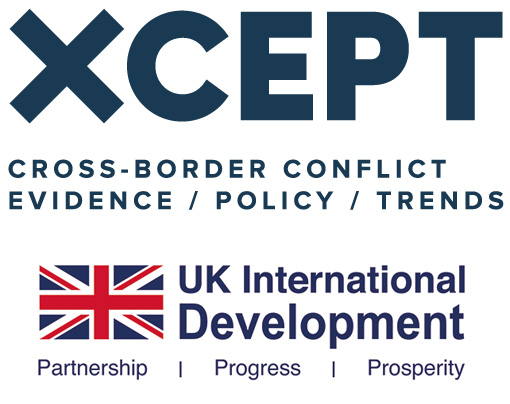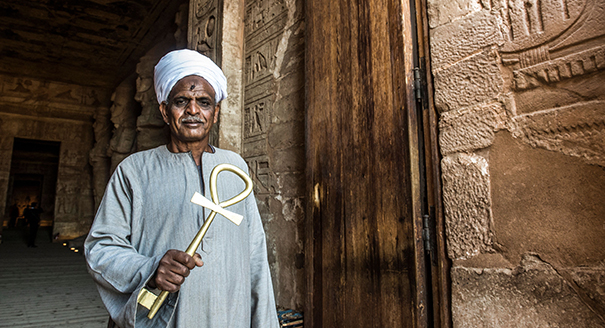The Egyptian governorate of Aswan is situated along the Nile River and borders Sudan. Its capital, Aswan city, is the southernmost urban agglomeration in Egypt and has the distinction of having remained stable during the uprising of 2011, when much of the rest of the country was plunged into turmoil.
 Abu Simbel temple in Aswan Governorate
Abu Simbel temple in Aswan Governorate
Yet Aswan has hardly escaped the economic problems that have affected Egypt since the uprising ended the rule of longtime president Hosni Mubarak. Tourism, a major source of revenue, dried up quickly due to foreigners’ fears of instability following Mubarak’s ouster, and has since shown only modest signs of recovery. Making matters worse, Aswan city has long suffered from neglect at the hands of the central government, a state of affairs that has improved only slightly in the post-Mubarak era. And Egypt’s cross-border trade with Sudan, of which Aswan would be a major beneficiary, has never realized its potential, hindered as it is by strained Egypt-Sudan relations.
Aswan Governorate’s dismal situation today is attributable in part to a decades-long policy pursued by the Mubarak regime, which disregarded the periphery in favor of developing—some would say overdeveloping—Cairo. At first, it seemed as though Egypt’s current president, Abdel-Fattah al-Sisi, would continue this trend. During his electoral campaign, Sisi seemed unwilling to travel to the south, Aswan included. A video call to a campaign event in Asyut constituted the extent of his outreach. Once Sisi had consolidated power, however, he began to take an interest in Aswan. For example, he visited Aswan city to participate in two propaganda-themed youth conferences, one in January 2017 and the other in March 2019, in the run-up to which Aswan had been named the Capital of African Youth.
 A boat on the Nile bearing the logo of the African and Arab Youth Conference
A boat on the Nile bearing the logo of the African and Arab Youth Conference
Sisi’s newfound enthusiasm for Aswan brought with it certain benefits. His visits, once scheduled and confirmed, facilitated improvements to the city’s infrastructure. The airport road, for instance, received a much-needed overhaul.
Yet the inhabitants of Aswan city remained wary. In interviews, they expressed fears that Sisi might unilaterally decide to sell their land to foreign investors from the Gulf countries. That is what the president allegedly did with parts of Boulaq Island in Cairo. Separately, he transferred sovereignty over Tiran and Sanafir Islands, which are located in the Red Sea, to Saudi Arabia.
At least the aforementioned youth conferences generated some tourism for the city. Historically, Aswan’s economy has relied on international tourism, given the Nubian and ancient Egyptian ruins dotting its landscape, and the warm weather it enjoys in winter. By the end of 2010, tourist figures had reached an all-time high. Some 442,000 people visited Aswan Governorate that year. However, tourism plummeted following the uprising. According to the governorate’s official records, 153,000 tourists visited in 2011, a figure that dropped to 137,000 in 2012, and to around 115,000 in both 2013 and 2014. Today, eight years after Mubarak’s ouster, Aswan’s renowned attractions, such as the sprawling main market and the beautiful Nubian village of Gharb Sohail, still see few tourists.
 Aswan’s market, which in better times would be bustling with tourists
Aswan’s market, which in better times would be bustling with tourists
 With few tourists visiting, empty boats remain docked at Gharb Sohail
With few tourists visiting, empty boats remain docked at Gharb Sohail
According to people in Aswan, the precipitous decline in tourism has stoked sociopolitical tensions. Normally in the governorate such tensions do not lead to violence. There are two main reasons for this. Political parties—both Islamist and secular—do not maintain nearly as robust a presence in Aswan, including Aswan city, as they do in other Egyptian regions. At the same time, the dominant strain of Islam in the area is Sufism, which militates against uncompromising ideologies of any sort.
In recent years, however, two large-scale outbreaks of violence took place. The first had a distinct political dimension. On August 14, 2013, the same day that security forces in Cairo violently dispersed a pro-Morsi sit-in following the late president’s removal from power, a clash took place in Aswan between the police and a crowd of locals outraged by what had happened in the capital.
In the second case, which occurred in April 2014, the harassment of a woman reignited an ethnically tinged feud between the Nubian Daboodiya and the Arab Hilaliya tribes. On previous occasions in which any of the tribes of the area were at loggerheads, a shared concern over the impact that an escalation might have on tourism impelled them and outside parties to prevent the feuds from turning violent. Yet given the shriveling of the tourism sector, as well as the Sisi regime’s marginalization of civil society, the 2014 clashes continued unabated for over a week. Finally, local leaders were able to negotiate a truce between the two tribes. In a period of ten days, a total of 25 people were killed and 40 injured.
If the dearth of international tourists has affected the economy and even caused social strife, Aswan Governorate’s location on the border with Sudan holds out the tantalizing prospect that it could become a destination for people and goods entering Egypt from its southern neighbor. In a sense, this has already happened. According to estimates by officials who preferred to remain anonymous, in 2018 some 2 million Sudanese crossed into Egypt for the month of Ramadan—though it is unclear how many spent any time in Aswan.
Yet cross-border trade, of the sort that would enrich Aswan Governorate and turn Aswan city into an economic hub, continues to fall prey to political bickering. Indeed, although periodic joint announcements on the part of high-ranking Egyptian and Sudanese officials indicate that both countries are committed to strengthening bilateral ties, various disputes continue to stymie cooperation.
One such disagreement concerns sovereignty over an area known as the Halaib Triangle. Egypt considers the area part of the Red Sea Governorate, which abuts Aswan Governorate to the east. The origins of the dispute date back to the division of Egypt and Sudan into separate countries in the middle of the 20th century. Not only does acrimony over the territory flare up periodically, but even in times of relative quiet the issue hinders a full Egypt-Sudan rapprochement.
 The Halaib Triangle is the most significant of several Egyptian-Sudanese border disputes
The Halaib Triangle is the most significant of several Egyptian-Sudanese border disputes
A more recent spat stems from Sudan’s stance in support of Ethiopia’s Grand Ethiopian Renaissance Dam (GERD) project along the Nile, which Egypt sees as a direct threat to its water security. The dispute has manifested itself in several ways. For example, in 2013 Egypt began requiring Sudanese citizens to apply for and obtain an Egyptian visa in order to enter the country. This went against a 2004 agreement that allowed citizens of both countries to travel freely with only an identification card or a valid passport. Sudan responded in kind, and now Egyptians are required to obtain a visa before entering Sudan.
Ultimately, disputes such as those over the Halaib Triangle and GERD hamper attempts to increase cooperation and economic trade between Egypt and Sudan. In all likelihood this will remain the case, irrespective of improved means of conducting trade.
Consider, for example, the case of overland border crossings. In 2015, the first such crossing was opened between Egypt and Sudan in Qustul (located in Aswan Governorate). This reduced travel time from seventeen hours via Nile ferries (between the High Dam port in Egypt and Halfa port in Sudan) to five hours. Qustul was touted as the first of three new overland border crossings to be opened between the two countries. The second, Arqin, was inaugurated by Sudan in 2017. There is no word yet on the third. Officials from both countries have announced on numerous occasions that overland border crossings would revive trade, with some estimating that, annually, this would skyrocket from $1 billion worth of goods to $15 billion.
 Trucks lined up at the Qustul border crossing to enter Sudan
Trucks lined up at the Qustul border crossing to enter Sudan
Nothing of the sort has happened. To be sure, cargo trucks and the odd group of visitors are making use of the crossings, but not nearly to the extent anticipated. Indeed, Aswan, despite a history of serving as a trading center between Egypt and its southern neighbors (its name is derived from an ancient Egyptian word meaning “the market”), remains stuck in the economic doldrums.
As for the people of Aswan city, they seem to know that whether the question is one of sustained government development programs, a return of tourists, or increased trade with Sudan, a long wait is in order. And many do not want to wait. In interviews, several young people in Aswan city stated they would emigrate if given the chance.







